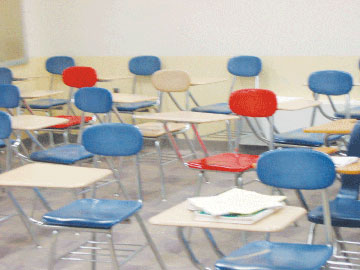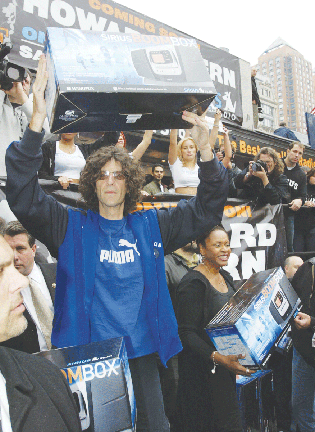University Pushes Ahead With Capital Plan
October 20, 2004
With the university’s budget balanced for another year, the campus is pushing forward with ambitious plans to fix major deferred maintenance problems as dorms lay on the backburner indefinitely.
“The budget is balanced,” said Vice Chancellor of Administration and Finance Ellen O’Connor. “The particulars will be announced this week. I expect Chancellor Motley will be able to report that this will be a good, solid year of implementing the strategic plan of the university, emphasizing increasing the faculty, strengthening our commitment to students, and a pretty good commitment to continuing to catch up with the capital needs.”
Despite an increase in the amount of the subsidies from the legislature and substantial increases in student fees, campus spending grew as well.
“It has been quite a challenge to get the budget balanced for that reason,” said O’Connor. “And all the while doing and implementing the ideas, programs, and visions that Chancellor Motley has, that [Vice Chancellor] Kathy Teehan has in Enrollment Management, that [Vice Chancellor] Charlie Titus has in Student Affairs, and certainly that Paul Fonteyn has as provost.”
Decisions made by the UMass President’s Office on information technology will increase spending by 3 to 4 million dollars, to pay for a new admissions, enrollment, and financial aid system that will be implemented in February, and an upgrade to administration and finance systems.
But with the budget now stable, university officials are looking to cement a 10-year capital plan. “UMass Boston needs a huge investment in the capital plan,” O’Connor said. The capital plan is re-submitted every year by each campus in the system. For UMass Boston, the total capital plan over ten years is $266 million, with a five year focus.
Most notably, this year it did not contain proposals for approval of student housing on campus.
“That is not to say that is no longer a priority of UMass Boston,” said O’Connor. “We know that housing students is a priority. The reason we did not ask for it at this time, and we told the Board of Trustees this, was that we had agreed with the President’s Office that we would seek and obtain the support of the community and the elected officials before we seek [the trustees’] approval.”
Dorms were a hot topic when first announced over three years ago, with both then-President William Bulger and then-Chancellor Jo Ann Gora making them a top priority. The proposal quickly came under strong opposition from many members inside and outside the university community, including state legislators and neighborhood activists. The project was put on hold last year when Gov. Mitt Romney cancelled a bond intended to help pay for it. Chancellor Gora left in August to take over as president of Ball State University.
The UMass system’s campuses are similar in their deferred maintenance problems, said O’Connor. “That is, that we all have substantial deferred maintenance issues, health and safety problems,” she said, noting that there is a short time frame for “urgent repairs” to the campus’ core. Wheatley Hall, McCormack Hall, Science Center, Healey Library, and Quinn Administration are part of a mega-structure with one foundation that is steadily deteriorating. The buildings were designed and built in the 1970’s.
“Faculty at UMass Boston are now conducting more sophisticated, more complicated, more remarkable research, and need better infrastructure in which to that,” O’Connor said. “So much of what we’re doing in the capital plan will provide for that.”
Strong support has emerged from the President’s Office for addressing the repairs, according to O’Connor. UMass President Jack Wilson has sent a letter to David Perrini, the commissioner of the Department of Capital Asset Management (DCAM), telling him of the urgent need to look at the upper and lower levels of the campus, and inviting him to a walkthrough of the structure led by Wilson and James Karam, head of the Board of Trustees.
“This is the right step,” said O’Connor. “People are recognizing that the upper level, lower level structure problems must be addressed.”
The repairs and other deferred maintenance make up the bulk of the capital plan, ranging from the repairs to the upper and lower levels ($42.2 million), to campus-wide upgrades of heat, ventilation, and air conditioning (HVAC) ($9 million), to science lab renovations ($8.8 million), to seawall and promenade repairs ($1 million), and catwalk repairs ($810,000).
Also included is $25 million for the Boston Environmental Science and Technology (BEST) Park, which university officials hope to start building by 2009. The site is located where the Calf Pasture Pump Station currently resides across the street from the campus. Both the Boston Sewer and Water Commission and UMass Boston laid claim to the parcel, with the BSWC wanting to build a $10 million dollar pumping facility. The BSWC took UMB to court, and the Suffolk Superior Court ruled earlier this year that the land belongs to UMB. The BSWC has plans to appeal, which may take an estimated two years. In the meantime, the university is in ongoing discussion with the city over the parcel.
“It’s our hope that because of communications and negotiations going on in parallel with legal efforts, that a solution will be found to re-locate the water and sewer functions to the city of Boston proper,” O’Connor said.






















































